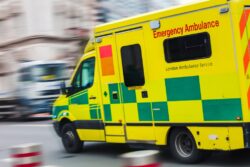Ambulance workers are going on strike – but will your local service be impacted? (Picture: Getty)
Strikes are becoming par for the course in 2023, with walkouts hitting multiple industries.
Ambulance strikes are no exception, as a dispute over pay and staff shortages continues to rage on – culminating in more days of action, organised by several unions.
Naturally, it’s quite worrying to hear that essential workers are hitting the picket lines, and you may be wondering how this is set to affect ambulance services.
Here, you can find the next ambulance strike dates, and where in the UK the strikes are taking place.
Plus what the advice for dealing with a medical emergency is on those days…
When are the ambulance strikes?
Industrial action by ambulance staff is next scheduled for Thursday, January 19 (Wales only) and Monday, January 23 (England and Wales).
Strikes take place in January and February (Picture: Hesther Ng/SOPA Images/LightRocket via Getty Images)
Ambulance trusts in England and Wales will then be impacted by even more striking.
Action is earmarked for several upcoming Mondays: February 6, February 20, March 6 and March 20.
Around 10,000 GMB members, who comprise paramedics, care assistants, emergency call handlers and other ambulance staff, are set to walk out on these days.
Regional strikes are also due to happen on Tuesday, January 24 and Monday, February 13, also organised by the union GMB.
Which areas are affected by ambulance strikes?
Full list of areas impacted by the January/February 2023 ambulance strikes
January 19
Unite members at the Welsh Ambulance Service are due to take a day of industrial action.
January 23
GMB members at West Midlands Ambulance Service will strike.
Meanwhile, Unison says its members from the following ambulance trusts have been striking:
London Ambulance
North East Ambulance
North West Ambulance
South West Ambulance
Yorkshire Ambulance.
As for Unite, it seems the strikes will affect the West Midlands, North West, North East, East Midlands and Wales.
January 24
GMB members at North West Ambulance Service will strike.
February 6
GMB members at the following ambulance services will be walking out on these dates:
East Midlands Ambulance Service
Mersey Care NHS
North East Ambulance Service
North West Ambulance Service
South Central Ambulance
South East Coast Ambulance Service
South West Ambulance Service
Welsh Ambulance Service
Yorkshire Ambulance Service.
February 13
GMB members at Mersey Care NHS are set to strike on this day.
February 20, March 6 and March 20
GMB members at the following ambulance services are due to strike on these dates:
East Midlands Ambulance Service
North East Ambulance Service
North West Ambulance Service
South Central Ambulance
South East Coast Ambulance Service
South West Ambulance Service
Welsh Ambulance Service
Yorkshire Ambulance Service.
More: NHS
These locations may change as the situation develops – Unite, for example, announced on January 18 that more strike dates will be forthcoming, but details are TBC.
To read the latest, check GMB Strike FAQs, the Unite website, and Unison Ambulance Strike page.
What calls will paramedics respond to?
It is understood that those suffering from ‘life-threatening conditions’ will still be able to receive emergency aid.
Sir Stephen Powis, the national medical director for NHS England, has said of recent strikes: ‘We’ve been working very closely with the unions to ensure that emergency services for life-threatening conditions are maintained.
‘That will include stroke and heart attacks.
To view this video please enable JavaScript, and consider upgrading to a web
browser that
supports HTML5
video
‘There are increased clinicians in call centres to ensure that the right response goes out to the right incident.’
What to do if you need emergency help during a strike
If you have a medical emergency, you should still call 999, the official advice says.
And if you need urgent medical help, but it is not an emergency, you should still use 111 online or call 111.
As per NHS England website’s page for industrial action, last updated on January 17: ‘Patients should only call 999 if it is a medical or mental health emergency (when someone is seriously ill or injured and their life is at risk).
‘Ambulances will still be able to respond in these situations, but this may only be where there is an immediate risk to life.’
More: Strikes
However, it does say: ‘Patients should take advice from 111/999 call-handlers on whether there are circumstances where it is suitable for them to make their own way to hospital.’
It also adds: ‘The NHS is asking patients to use services wisely during industrial action and take simple steps to help ensure care is available to patients who need it most.
‘This includes using 111 online as the first port of call for health needs and continuing to only use 999 if it is a life-threatening emergency.’
Back in December when strike dates were announced, the chief executive of the NHS Confederation, Matthew Taylor, echoed the importance of calling 999 in an emergency.
He said: ‘Health leaders are also concerned that the prospect of strike action may affect how people decide to engage with the NHS, but the advice remains that if it is an emergency, it is vital they should still call 999.’
MORE : Thousands of ambulance workers to hold more strikes in February and March
MORE : Ambulance crews to ‘dump patients in A&E’ if they’re left waiting 45 minutes
MORE : Dad whose toddler stopped breathing in wait for ambulance will join striking crews
Follow Metro across our social channels, on Facebook, Twitter and Instagram
Share your views in the comments below
More strikes are en route.





